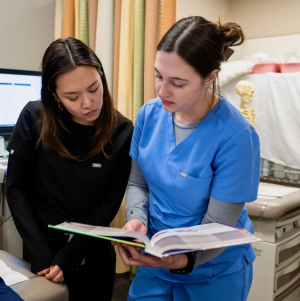Top 5 reasons to get an MSN
 Pursuing a Master of Science in Nursing (MSN) degree is a natural step for many registered nurses and nursing students. Whether you are interested in more career opportunities, a higher salary, or wish to lead the charge in health care transformation, extending your education with an MSN is a worthy consideration.
Pursuing a Master of Science in Nursing (MSN) degree is a natural step for many registered nurses and nursing students. Whether you are interested in more career opportunities, a higher salary, or wish to lead the charge in health care transformation, extending your education with an MSN is a worthy consideration.
Advanced nursing positions are in high demand. With a growing focus on preventive care and an increased need due to population aging, nursing specialists, including nurse practitioners, nurse anesthetists, and nurse midwives, are among the field’s highest-paid professionals. If you are looking for ways to advance your career, consider these top five reasons to get an MSN.
1. Develop your professional skills and knowledge
Enhancing your education with an MSN degree allows you to develop specialized skills and core competencies in areas such as leadership and administration, informatics, and advanced practice nursing. MSN programs also enable students to focus on the discipline of their choice and provide the opportunity to develop the skills they need to succeed.
MSN curriculums typically include:
- Organizational and Operational Leadership
- Data Analytics and Informatics
- Health Care Evaluation
- Policy and Advocacy
- Evidence-Based Practice
2. Opportunity to advance to leadership or managerial positions
For those seeking to take a leadership role in health care, earning your MSN can open a wide range of career opportunities. Whether you are interested in leading cross-functional care teams, improving nursing processes, educating nurses, or helping shape health policies, an MSN may be the perfect next step to your dream career.
Leadership and managerial positions for MSN graduates include:
- Assistant Nursing Manager
- Chief Nursing Officer
- Clinical Research Specialist
- Director of Case Management
- Nursing Supervisor
- Surgical Nurse Manager
3. Prepare for the future of health care
The health care industry is undergoing rapid changes. One of the primary drivers of this transformation is the increased focus and reliance on health data. Advanced data modeling and analytics provide leaders with insights on everything from operational efficiency to halting the spread of epidemics.
Career outcomes for graduates with an MSN in Nursing Informatics include:
- Chief Information Officer
- Clinical informaticians
- Nurse Consultant
- Nurse Educator
- Policy Developer
- Research Nurse
4. Increase your earning potential
One of the most common reasons RNs and nursing students get an MSN is for higher earning potential. According to the U.S. Bureau of Labor Statistics (BLS), the median annual salary for advanced practice nurses is $113,930, with a projected job growth rate of 45%.
MSN graduates can also expect to earn a significantly higher salary than RNs without a graduate degree. U.S. News & World Report found that jobs that require an MSN on average start $20,000 higher or more than positions that require a bachelor’s degree.
5. Access to online degrees
Online MSN degree programs can be excellent choice for working RNs because they provide flexibility for work schedules, personal responsibilities, and family commitments. Some MSN programs also offer a combination of synchronous and asynchronous learning so that students can work at their own pace and benefit from real-time interaction with their instructors and peers. There are even online MSN programs that offer on-campus intensives for students to meet one-on-one with their faculty and classmates.
To learn more about MSN programs, visit U-M School of Nursing's MSN Overview Page. Reach out to a recruiter to request more information about U-M School of Nursing's programs.





